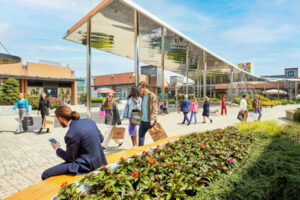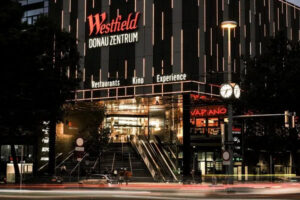The total stock of modern shopping centers in Bulgaria in the first half of 2016 was 771,260 sq m, with 406,660 sq m of that in Sofia. An insignificant decline in the total volume was noticeable for the second consecutive half-year period as a result of the transformation of retail into office space in certain projects like Tzum and Galeria Plovdiv. The ratio of “leasable retail space in shopping centers per 1,000 inhabitants” stood at 323 sq m for Sofia and 108 sq m for the country as a whole.
The stable absorption levels in modern shopping centers in Sofia and the lack of new supply outlined the trend of diminishing vacancy. Malls operational for more than two years registered 94% occupancy while long-established ones maintained 98 to 99% levels.
An exception is City Center Sofia, due to its ongoing repositioning process. Tenant mix improvement and ensuring competitive advantages remained the main driver of modern retail space supply. As a result, Bulgarian malls were characterized by increased activity in tenant replacements within the centers.
According to Colliers, the supply of retail space on high streets in the capital decreased compared to the previous period. The vacancy rate in Sofia amounted to 6% and on Vitosha Boulevard to just 3%.
Marks & Spencer retreats
Modern shopping centers in Sofia retained the absorption levels from the previous period: nearly 15,000 sq m of leasable space, compared to 16,370 sq m in the second half of 2015. In well-established projects enjoying active demand, this represents an average share of 4% from the GLA. Colliers’ analysis revealed that the shopping mall with the highest rate of new tenants in Sofia is Serdika Center, followed by Paradise Center, and Sofia Ring Mall.
Sofia Ring Mall, the latest project in the market, continues to attract new concepts. Proof of this is Lidl’s decision to open its first shopping center location in the capital there.

In the first six months of 2016, first representative stores in Bulgaria were opened by Forever 21, Primigi and Thomas Sabo. A change in business development strategies led to Marks & Spencer’s withdrawal from five markets in Eastern Europe: Bulgaria, Croatia, Montenegro, Serbia, and Slovenia.
Retail parks continued their development in the country. Retail Park Varna refreshed its mix almost entirely. The household goods store Dominico opened its first location in
Bulgaria there and the Danish furniture chain Jysk and the consumer electronics hypermarket Zora joined Decathlon, Ikea, and Comsed in the project.
Drugstores in the lead
In the Fast-Moving Consumer Goods (FMCG) segment, drugstores again took the lead from food chains in terms of the number of new openings. Lilly (8) and dm (7) scored as the most active. During the first six months, Billa opened four new stores and Kaufland and Lidl just one each.
By contrast, Penny Market’s exit from the Bulgarian market resulted in increased activity, predominantly expansion and consolidation in the big-box segment. T-Market acquired 12 sites and ranked third in the number of stores in the country. The electronics chain Techmart continued to expand in malls. After opening a store in Mall Varna in 2015, the retailer opened another one in Burgas Plaza.
In the DIY segment, Praktiker ran active restructuring—optimizing its network by relocating to owned premises and introducing a new brand concept. The fashion giant H&M kept expanding in the country and added a new store in Mall Rousse opened on an area of 2,000 sq m.

Retailers on high streets registered stable performance. The percentage of tenants that moved to or away from Vitosha Boulevard shrank fourfold: from 12% to 3% in the first six months of 2016. The restaurant and cafe segment continued to expand with 10% annual growth and reached a share of 24%. High streets in Sofia followed the trends of Vitosha Boulevard, with replacement levels contracting by half from 12% to 6%.
E-commerce continued to gain speed in Bulgaria. After Decathlon and H&M, two large retail operators established online platforms in Bulgaria, namely Zara and CCC.
Forecast
Until the end of 2016, the modern retail market will undergo sustainable development, with decreasing levels of supply and stable demand. A notable reorganization is expected mainly in the food supermarket segment in shopping centers. High streets will continue to generate growing interest from both tenants and buyers.
Prime rental rates in malls and Vitosha Boulevard will remain steady. The stabilization of the market is a prerequisite to reviving the attention of international operators to Bulgaria and to their increased activity there.





